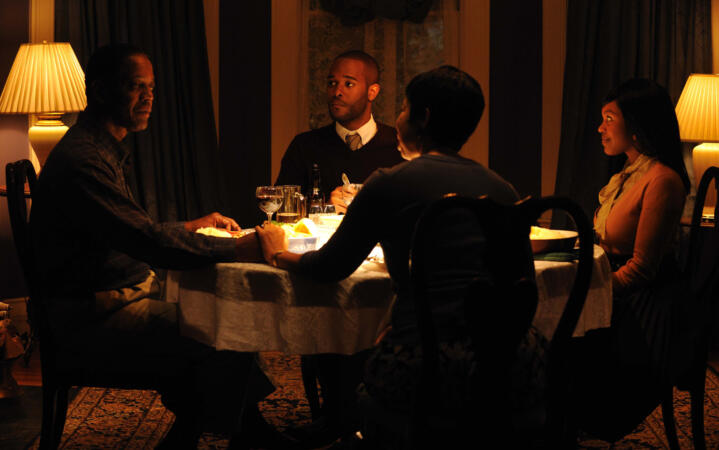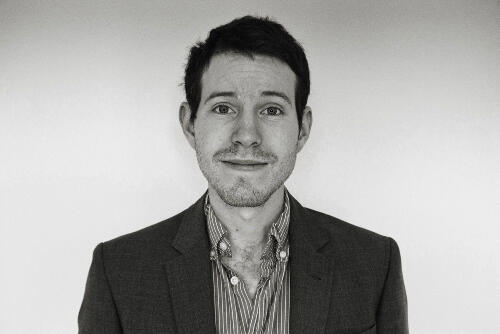
A little over a week ago, Shadow and Act introduced many readers to a short film that had the internet abuzz with all types of mixed emotions (watch it below). It seemed that most who viewed director Ari Aster’s The Strange Thing About The Johnsons had a strong reaction to it, and a personal opinion regarding the film’s meaning. Well, S&A reached out to Aster and he has provided answers to a lot of the questions our readers had about his film.
S&A: Where did the concept for your film originate?
Ari Aster: It was actually an idea that sprouted between me and a few friends (one of whom plays the son in the Johnsons) the summer before my first year at AFI. We were talking about topics that are too taboo to be explored, and so we arrived at taboos that weren’t even taboos because they were so unfathomable, and the most popular was that of a son molesting his father. “That should never be made into a film!” So, it began on that level, but from there it evolved into something very different.
What led you to decide on using an all-black cast? Was it a gimmick, complete colorblind casting, or an impromptu decision, maybe?
The actor who plays the son is a close friend who’s starred in most of my films (including all of my pre-AFI student work) and he was there from the film’s conception. I cast him because he was right for the role and I wanted to work with him. At that point it was obvious that we were casting African Americans. The color of the Johnson family’s skin is totally incidental. It’s of no consequence to the story or its execution.

Did the casting of black actors in a film with such a provocative theme lead to any reservations about going forward with the project?
Not really. Again, the color of the family isn’t important. We certainly assumed that casting black actors in a film that tackles such transgressive themes would create something of a stir, and it would be a lie to say that we weren’t hesitant, especially as many people were advising us against the decision. But the longer the dialogue continued about whether it was okay to cast the way we wanted to (without making a discernible statement on race), the more exciting that argument became. There is no intended commentary on the black experience and I would never claim to have any insight into that.
Were there any concerns on your part regarding how viewers would perceive the film?
Were we concerned? Not really. Were we aware that this would be polarizing? Of course. We anticipated some backlash, especially in the beginning (when the idea was still fresh to us), but I lived with this premise for so long that I basically forgot how disturbing it was. Once we committed to the project, the challenge wasn’t to find new ways of keeping it shocking or outrageous for 30 minutes; it was to tell the story as dramatically as we could, and to keep true to our original intentions without overstepping our own boundaries of taste. We also had to fight to raise the budget ourselves, so convincing people to donate money to this “role-reversing incest whatsit” was more difficult than releasing it to an anonymous group of people.
I also have to say that we were on our festival run and the movie was unexpectedly leaked onto the internet, which caught us completely off-guard.
Did the actors in your film have any reservations about any aspects of your film?
No. They had questions when they first came onto the project – many of them were the same questions that I’m answering here – but they were all totally on board. I think the actors saw it as an opportunity to play something different. If the film works, it’s because of their commitment.
There has been much debate on our site, and all over the Internet, about the meaning and intent of your film; can you explain whether The Strange Thing About The Johnsons was intended to be humorous or dramatic?
Why not both? I see the film as a satire of the domestic melodrama (a la Douglas Sirk or Nicholas Ray), so it draws more from movie cliches and genre tropes, especially from films dealing with abuse or family dysfunction, than it does real life. But it was a challenge for us (and something that we always kept in mind) to transcend the absurdity of the premise and to actually consider the implications of such a thing. In a lot ways the film serves as a nightmarish cautionary tale on liberal parenting, a sort of worst-case scenario for a father who’s granted his son too much freedom and respect, but there’s also the suggestion of culpability on the father’s part, so the film skips a lot of the causes and focuses primarily on the effects of an insidious, inverted dynamic.
In the end, we just wanted to make a film that was compelling, visceral and unique.
Watch the short film below if you missed it:

